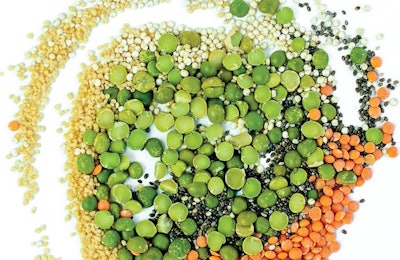
The pet food industry has long conducted scientific research on dogs’ and cats’ nutrient needs and usage of pet food ingredients, yet most is on “traditional” ingredients: proteins like chicken and beef, as well as grains such as corn, wheat and rice.
As the market has morphed to humanization and premiumization, with pet owners seeking foods and ingredients similar to what they eat themselves, many pet food formulations now have ingredient decks featuring novel proteins like kangaroo and quail, plus non-grain starches like peas, lentils and potatoes. The downside is there isn’t much publicly available research about use of those ingredients in pets.
That issue underpins the mystery surrounding recent atypical cases of dilated cardiomyopathy (DCM) in dogs, many of which had been eating grain-free diets high in legumes and potatoes. “There’s a fair amount of research on those for human nutrition, but you could count the number of research studies on one hand on the use of them in the dog and cat,” said Greg Aldrich, Ph.D., president of Pet Food & Ingredient Technology Inc. “That doesn’t mean the companies haven’t done those research projects internally, but we just don’t see those in the public domain.”
“Those are more challenging ingredients to work with; we don’t know as much about them, whether it could be a deficiency or bioavailability issue or toxicological issues coming into play,” agreed Lisa M. Freeman, Ph.D., professor at Cummings School of Veterinary Medicine at Tufts University. She and Aldrich were panelists for a September 4 webinar on the U.S. Food and Drug Administration’s (FDA) investigation into the new cases of DCM; they were joined by Martine Hartogensis, D.V.M., deputy director at FDA’s Center for Veterinary Medicine's Office of Surveillance and Compliance.
While most of the pets affected were eating grain-free diets, not all were; and taurine deficiency was a factor in some cases but not all. The investigation is also looking at other essential amino acids, such as methionine and cystine. “Much of today is speculation,” Aldrich said. “We’re seeing correlations and associations, but there have been no direct studies of these legume seeds and their effect on taurine.” The same is true for potatoes.
Until we have more peer-reviewed research on some of today’s popular pet food ingredients, we may continue to have disheartening mysteries like the current DCM situation.



















